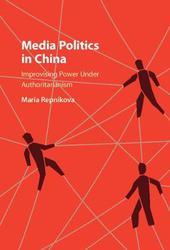
|
Media Politics in China: Improvising Power under Authoritarianism
Hardback
Main Details
| Title |
Media Politics in China: Improvising Power under Authoritarianism
|
| Authors and Contributors |
By (author) Maria Repnikova
|
| Physical Properties |
| Format:Hardback | | Pages:264 | | Dimensions(mm): Height 237,Width 160 |
|
| ISBN/Barcode |
9781107195981
|
| Classifications | Dewey:302.20951 |
|---|
| Audience | | Professional & Vocational | |
|---|
| Illustrations |
Worked examples or Exercises; 6 Tables, black and white; 3 Halftones, black and white
|
|
Publishing Details |
| Publisher |
Cambridge University Press
|
| Imprint |
Cambridge University Press
|
| Publication Date |
15 June 2017 |
| Publication Country |
United Kingdom
|
Description
Who watches over the party-state? In this engaging analysis, Maria Repnikova reveals the webs of an uneasy partnership between critical journalists and the state in China. More than merely a passive mouthpiece or a dissident voice, the media in China also plays a critical oversight role, one more frequently associated with liberal democracies than with authoritarian systems. Chinese central officials cautiously endorse media supervision as a feedback mechanism, as journalists carve out space for critical reporting by positioning themselves as aiding the agenda of the central state. Drawing on rare access in the field, Media Politics in China examines the process of guarded improvisation that has defined this volatile partnership over the past decade on a routine basis and in the aftermath of major crisis events. Combined with a comparative analysis of media politics in the Soviet Union and contemporary Russia, the book highlights the distinctiveness of Chinese journalist-state relations, as well as the renewed pressures facing them in the Xi era.
Author Biography
Maria Repnikova is a scholar of comparative authoritarianism and political communication in illiberal contexts, with a focus on China and Russia. She holds a Doctorate in Politics from the University of Oxford, where she was a Rhodes Scholar. In the past, Repnikova has researched Chinese migration to Russia as a Fulbright Fellow and held the Overseas Press Club fellowship in Beijing, and she was also a post-doctoral fellow at the Annenberg School for Communication. She speaks fluent Mandarin and Russian, and has spent extensive time in both China and Russia. She teaches international communication, Chinese media politics and society and information politics in non-democratic regimes.
Reviews'Meet China's critical journalists in this gripping book. They may not protest in the streets, but they cover critical social and political issues by deftly navigating the mine field of Chinese politics. Largely based in commercial media outlets, they build relationships of fluid collaboration with party officials while engaging in guarded improvisation in their journalistic profession. Different from their peers who manufacture journalism as party propaganda, they are more like social activists with a cause. And yet, all their critical journalism is produced, ironically, in a political context proverbially known as authoritarian. Maria Repnikova's important book draws on 120 interviews and a sophisticated understanding of Chinese media systems to illuminate how and why this ironical situation is possible and even understandable. In so doing, it explodes not a few conventional postulates about Chinese politics, media and society. This is a major contribution to the study of media politics and journalism in China and beyond.' Guobin Yang, University of Pennsylvania 'Media Politics in China is timely, extremely well-written and represents scholarship that is simultaneously broadly theoretical and intimately granular. Repnikova's approach to Chinese state-society relations through her treatment of the iterative, improvised relationship between government/Party and critical journalists takes our understanding of media politics in China to a whole new level.' Andrew Mertha, Cornell University, New York '... this book makes an original, thoughtprovoking and necessary contribution to our understanding of Chinese media politics and Chinese politics on the whole.' Preksha Shree Chhetri, Europe-Asia Studies
|